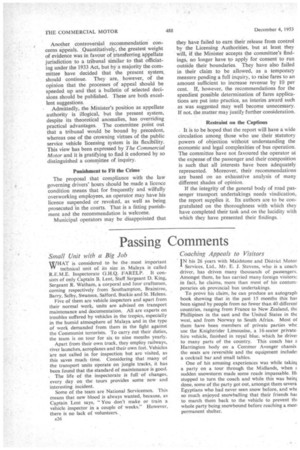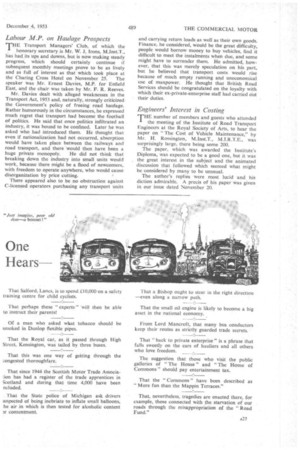Passing Comments
Page 28

Page 29

If you've noticed an error in this article please click here to report it so we can fix it.
Small Unit with a Big Job
WHAT is considered to be the most important Tv technical unit of its size in Malaya is called R.E.M.E. Inspectorate G.H.Q. FARELP. It consists of only Captain B. Lent, Staff Sergeant D. King, Sergeant R. Watham, a corporal and four craftsmen, coming respectively from Southampton, Braintree, Barry, Selby, Swansea, Salford, Buckie and St. Helens.
Five of them are vehicle inspectors and apart from their normal work, units are advised on transport maintenance and documentation. All are experts on troubles suffered by vehicles in the tropics, especially in the humid atmosphere of Malaya and in the type of work demanded from them in the fight against the Communist terrorists. To carry out their duties, the team is on tour for six to nine months yearly.
Apart from their own truck, they employ railways, river launches, aeroplanes and their own feet. Vehicles are not called in for inspection but are visited, as this saves much• time. Considering that many of the transport units operate on jungle tracks, it has been found that the standard of maintenance is good.
The life of the inspectorate is full of changes, every day on the tours provides some new and interesting incident.
Some of the team are National Servicemen. This means that new blood is always wanted, because, as Captain Lent says, "You don't make or train a vehicle inspector in a couple of weeks." However, there is no lack of volunteers.
A26
Coaching Appeals to Visitors
JN his 26 years with Maidstone and District Motor
Services, Ltd., Mr. E, J. Stevens, who is a coach driver, has driven many thousands of passengers. Amongst them, he has carried many foreign visitors; in fact, he claims, more than most of his contemporaries oh provincial bus undertakings.
To prove his claim, he can produce an autograph book showing that in the past 15 months this has been signed by people from no fewer than 40 different countries, ranging from France to New Zealand, the Phillipines in the east and the United States in the west, and from Norway to South Africa. Most ol them have been members of private parties whc use the Knightrider Limousine, a 16-seater private. hire vehicle, finished in royal blue, which he drive! to many parts of the country. This coach has s Harrington body on a Commer Avenger chassis the seats are reversible and the equipment include a cocktail bar and small tables.
One of his amusing experiences was while takinE a party on a tour through the Midlands, when C sudden snowstorm made some roads impassable. It stopped to turn the coach and while this was beini done, some of the party got out, amongst them severa Egyptians who had never seen snow before, and whe so much enjoyed snowballing that their friends ha( to march them back to the vehicle to prevent thi whole party being snowbound before reaching a mon permanent shelter.
Labour M.P. on Haulage Prospects
THE Transport Managers' Club, of which the honorary secretary is Mr. W. J. Irons, Minst.T., has had its ups and downs, but is now making steady progress, which should certainly continue if subsequent monthly meetings prove to be as lively and as full of interest as that which took place at the Charing Cross Hotel on November 25. The speaker was Mr. Ernest Davies, M.P. for Enfield East, and the chair was taken by Mr. F. R. Reeves.
Mr. Davies dealt with alleged weaknesses in the Transport Act, 1953 and, naturally, strongly criticized the Government's policy of freeing road haulage. Rather humorously in the circumstances, he expressed much regret that transport had become the football of politics. He said that once politics infiltrated an industry, it was bound to be confined. Later he was asked who had introduced them. He thought that even if nationalization had not occurred, absorption would have taken place between the railways and road transport, and there 'would then have been a huge private monopoly. He did not think that breaking down the industry into small units would work, because there might be a flood of newcomers, with freedom to operate anywhere, who would cause disorganization by price cutting.
There appeared also to be no obstruction against C-licensed operators purchasing any transport units and carrying return loads as well as their own goods. Finance, he considered, would be the great difficulty, people would borrow money to buy vehicles, find it difficult to meet the instalments when due, and some might have to surrender them. He admitted, however, that this was merely speculation on his part, but he believed that transport costs would rise because of much empty running and uneconomical use of manpower. He thought that British Road Services should be congratulated on the loyalty with which their ex-private-enterprise staff had carried out their duties.
Engineers' Interest in Costing
THE number of members and guests who attended the meeting of the Institute of Road Transport Engineers at the Royal Society of Arts, to hear the paper on "The Cost of Vehicle Maintenance," by Mr. H. Rossington, M.Inst.T., M.I.R.T.E., was surprisingly large, there being some 200.
The paper, which was awarded the institute's Diploma, was expected to be a good one, but it was the great interest in the subject and the animated discussion that followed which seemed what might be considered by many to be unusual.
The author's replies were most lucid and his diction admirable. A precis of his paper was given in our issue dated November 20.
































































































